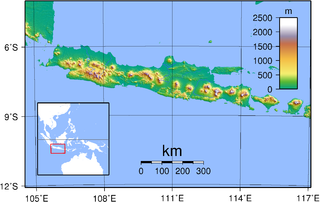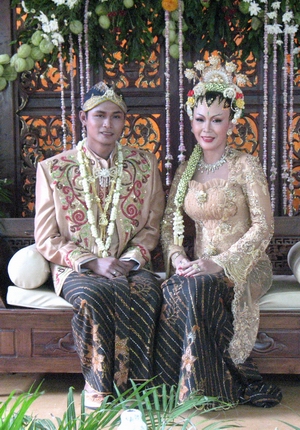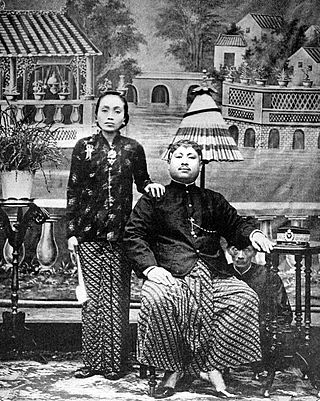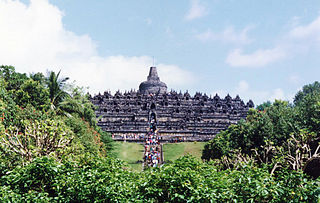Related Research Articles

The history of Indonesia has been shaped by its geographic position, natural resources, a series of human migrations and contacts, wars and conquests, as well as by trade, economics and politics. Indonesia is an archipelagic country of 17,000 to 18,000 islands stretching along the equator in Southeast Asia. The country's strategic sea-lane position fostered inter-island and international trade; trade has since fundamentally shaped Indonesian history. The area of Indonesia is populated by peoples of various migrations, creating a diversity of cultures, ethnicities, and languages. The archipelago's landforms and climate significantly influenced agriculture and trade, and the formation of states. The boundaries of the state of Indonesia match the 20th-century borders of the Dutch East Indies.

Java is one of the Greater Sunda Islands in Indonesia. It is bordered by the Indian Ocean to the south and the Java Sea to the north. With a population of 151.6 million people, Java is the world's most populous island, home to approximately 56% of the Indonesian population. Indonesia's capital city, Jakarta, is on Java's northwestern coast.

The Special Region of Yogyakarta is a provincial-level autonomous region of Indonesia in southern Java. It is a semi-enclave that is surrounded by Central Java to the west, north, and east except for a long coastline of the Indian Ocean to the south.

Javanese is a Malayo-Polynesian language spoken by the Javanese people from the central and eastern parts of the island of Java, Indonesia. There are also pockets of Javanese speakers on the northern coast of western Java. It is the native language of more than 98 million people.

Central Java is a province of Indonesia, located in the middle of the island of Java. Its administrative capital is Semarang. It is bordered by West Java in the west, the Indian Ocean and the Special Region of Yogyakarta in the south, East Java in the east, and the Java Sea in the north. It has a total area of 34,337.48 km2, with a population of 36,516,035 at the 2020 Census making it the third-most populous province in both Java and Indonesia after West Java and East Java. The official population estimate in mid-2022 was 37,032,410. The province also includes a number of offshore islands, including the island of Nusakambangan in the south, and the Karimun Jawa Islands in the Java Sea.

The Javanese are an Austronesian ethnic group native to the central and eastern part of the Indonesian island of Java. With more than 100 million people, Javanese people are the largest ethnic group in both Indonesia and in Southeast Asia as a whole. Their native language is Javanese, it is the largest of the Austronesian languages in number of native speakers and also the largest regional language in Southeast Asia. The Javanese as the largest ethnic group in the region have dominated the historical, social, and political landscape in the past as well as in modern Indonesia and Southeast Asia.

Priyayi was the Dutch-era class of the nobles of the robe, as opposed to royal nobility or ningrat (Javanese), in Java, Indonesia. Priyayi is a Javanese word originally denoting the descendants of the adipati or governors, the first of whom were appointed in the 17th century by the Sultan Agung of Mataram to administer the principalities he had conquered. Initially court officials in pre-colonial kingdoms, the priyayi moved into the colonial civil service and then on to administrators of the modern Indonesian Republic.

Petrus Josephus Zoetmulder S.J. was a Dutch expert in the Old Javanese language. He came from Utrecht and was associated with the Society of Jesus by 1925. He worked at Leiden University in the 1930s. His first work appeared in 1930 and he continued to write into the 1990s. He lived in Yogyakarta and was interred in the Jesuit necropolis at Muntilan, Java.

Kejawèn or Javanism, also called Kebatinan, Agama Jawa, and Kepercayaan, is a Javanese cultural tradition, consisting of an amalgam of Animistic, Buddhist, Islamic and Hindu aspects. It is rooted in Javanese history and religiosity, syncretizing aspects of different religions and traditions.

The Sultanate of Yogyakarta is a Javanese monarchy in Yogyakarta Special Region, in the Republic of Indonesia. The current head of the sultanate is Hamengkubuwono X.

A kyai is an expert in Islam, usually used among the ethnic Javanese people.

Yogyakarta is the capital city of the Special Region of Yogyakarta in Indonesia, in the south-central part of the island of Java. As the only Indonesian royal city still ruled by a monarchy, Yogyakarta is regarded as an important centre for classical Javanese fine arts and culture such as ballet, batik textiles, drama, literature, music, poetry, silversmithing, visual arts, and wayang puppetry. Renowned as a centre of Indonesian education, Yogyakarta is home to a large student population and dozens of schools and universities, including Gadjah Mada University, the country's largest institute of higher education and one of its most prestigious.

Nyi Roro Kidul is a supernatural being in Indonesian folklore. She is the Queen of the Southern Sea in Sundanese and Javanese mythology.

The Wali Songo are revered saints of Islam in Indonesia, especially on the island of Java, because of their historic role in the spread of Islam in Indonesia. The word wali is Arabic for "trusted one" or "friend of God", while the word sanga is Javanese for the number nine.

Several different religions are practised in Indonesia. Indonesia is officially a presidential republic and a unitary state without an established state religion. Indonesia has the world's largest Muslim population and the first principle of Indonesia's philosophical foundation, Pancasila, requires its citizens to state the belief in "the one and almighty God". Although, as explained by the Constitutional Court, this first sila of Pancasila is an explicit recognition of divine substances and meant as a principle on how to live together in a religiously diverse society. However, blasphemy is a punishable offence and the Indonesian government has a discriminatory attitude towards its numerous tribal religions, atheist and agnostic citizens. In addition, the Aceh province officially applies Sharia law and is notorious for its discriminatory practices towards religious and sexual minorities. There are also Islamic fundamentalist movements in several parts of the country with overwhelming Muslim majorities.

Kartasura is a district (kecamatan) in Sukoharjo Regency, Central Java, Indonesia. Kartasura is considered Surakarta's satellite city and a junction of highways to Yogyakarta and Semarang. It can be reached within minutes southward of Surakarta's Adisumarmo International Airport.

Javanese culture is the culture of the Javanese people. Javanese culture is centered in the provinces of Central Java, Yogyakarta and East Java in Indonesia. Due to various migrations, it can also be found in other parts of the world, such as Suriname, the broader Indonesian archipelago region, Cape Malay, Malaysia, Singapore, Netherlands and other countries. The migrants bring with them various aspects of Javanese cultures such as Gamelan music, traditional dances and art of Wayang kulit shadow play.
Merle Calvin Ricklefs was an American-born Australian scholar of the history and current affairs of Indonesia.

The following outline is provided as an overview of and topical guide to Indonesia:

Mosque architecture in Indonesia refers to the architectural traditions of mosques built in the archipelago of Indonesia. Initial forms of the mosque, for example, were predominantly built in the vernacular Indonesian architectural style mixed with Hindu, Buddhist or Chinese architectural elements, and notably didn't equip orthodox form of Islamic architectural elements such as dome and minaret. Vernacular architectural style varies depending on the island and region.
References
- ↑ Nakamura Mitsuo (1990) Islam in Java: Normative Piety and Mysticism in the Sultanate of Yogyakarta. The Journal of Asian Studies, Vol. 49, No. 3 (Aug., 1990), pp. 717-719